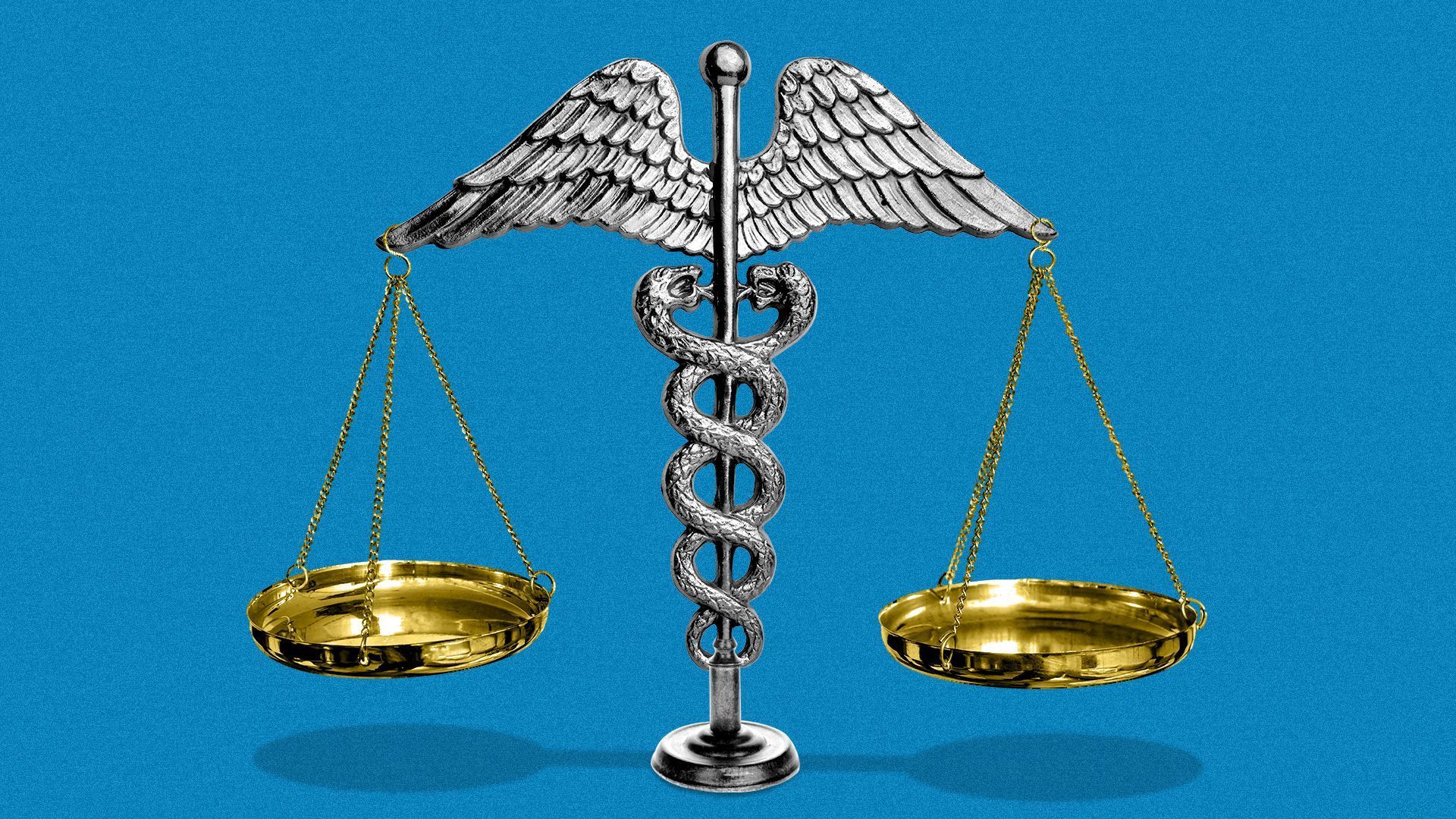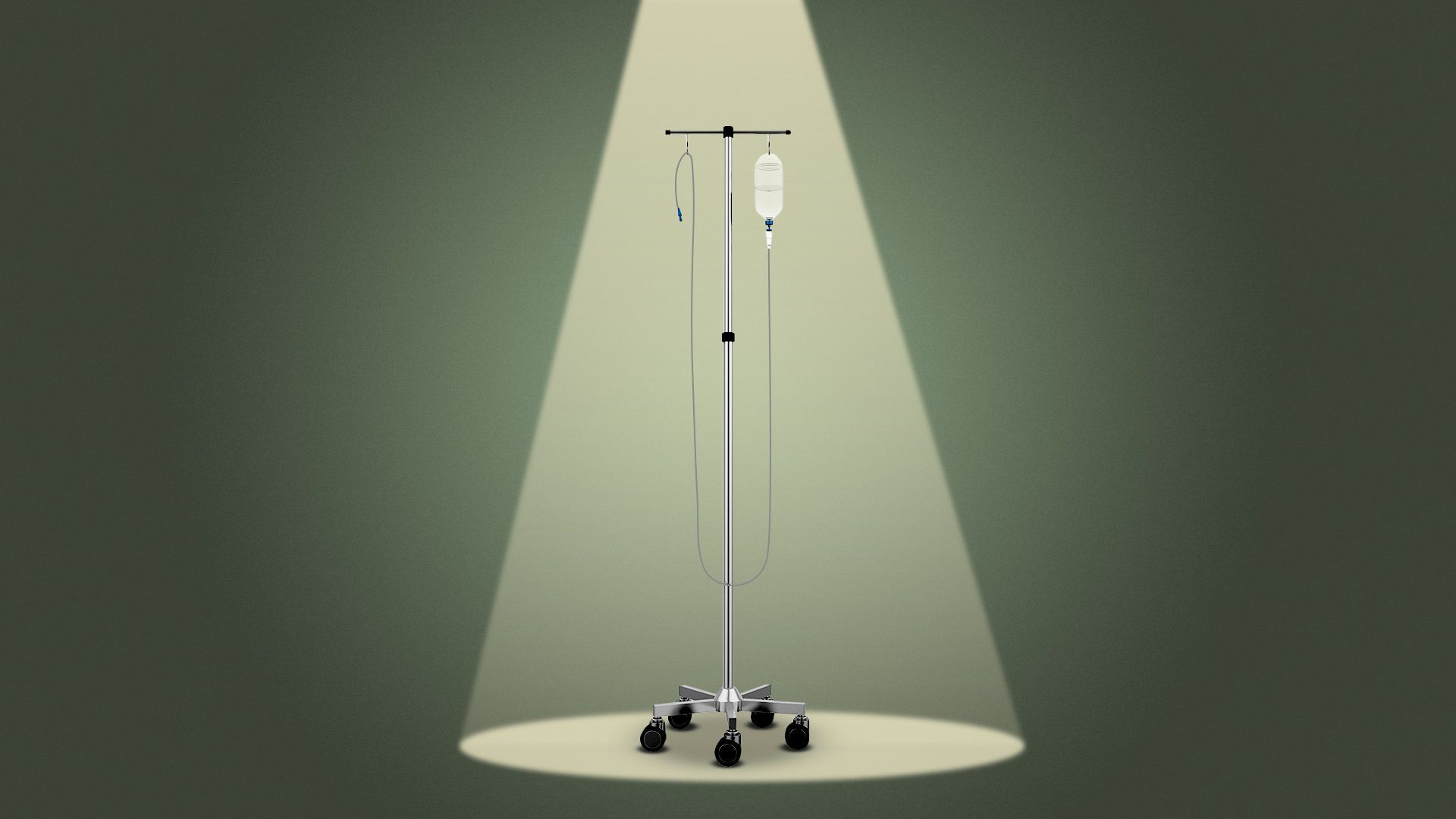| |
| |
| |
| Presented By PhRMA |
| |
| Axios Vitals |
| By Tina Reed · May 02, 2023 |
| Good morning, Vitals readers. Today's newsletter is 965 words or a 3½-minute read. 📆 Situational awareness: The Biden administration announced it will end COVID-19 vaccine requirements for federal employees and contractors, as well as international travelers starting May 11, the same day the public health emergency ends. - HHS and DHS will also "start the process" to end vaccine requirements for Head Start educators, CMS-certified healthcare facilities, and certain noncitizens at the land border, they said.
|
| |
| |
| 1 big thing: Red state providers' new abortion dilemma |
 |
|
| Illustration: Brendan Lynch/Axios |
| |
| Providers in states where abortion is banned may find themselves forced to navigate conflicting state and federal laws when pregnant patients come to emergency departments for care — and face serious consequences for noncompliance with both, Axios' Oriana González and Caitlin Owens write. Driving the news: For the first time since the Supreme Court overturned Roe v. Wade, the Department of Health and Human Services is investigating hospitals for allegedly violating a federal law that protects a patient's ability to get an abortion in emergency situations, regardless of whether a state has a ban or restrictions in place. What they're saying: "You could lose your hospital privileges if you fail to follow federal law and you could lose your license if you fail to follow state law," said Lawrence Gostin, a law professor at Georgetown University. - Health providers are "in a no-win situation — a horrible dilemma where your patient is right smack in the middle, and their health and life are at stake," Gostin told Axios.
The details: Missouri resident Mylissa Farmer, whose water broke at 18 weeks, was told by Missouri hospital staff that her pregnancy was not viable and that she was at risk of sepsis, hemorrhaging, loss of her uterus and death. - However, after she requested that her pregnancy be terminated, she was told that under Missouri's abortion ban, she had not yet "developed the Missouri definition of a 'medical emergency,'" so she could either wait or travel out-of-state, per CMS' notice to the hospital.
- Farmer traveled to the University of Kansas Hospital. While state law says that abortions can only be performed in the university's medical centers in cases of an emergency, a doctor told her that they could not end her pregnancy "due to the political climate," according to CMS' notice to that hospital.
- In both cases, CMS found that the hospitals failed to provide "necessary stabilizing care" and thus, violated EMTALA, Becerra said in his letter.
The other side: Anti-abortion groups argue that these laws clearly state what exceptions are allowed and the confusion is created by abortion rights activists' "misinformation." Go deeper. |
    |
| |
| |
| 2. Cardiac care and hospital-integrated docs |
 |
|
| Illustration: Brendan Lynch/Axios |
| |
| Heart patients were more likely to receive a high-intensity, hospital-based intervention when their doctor was employed by a hospital compared to patients whose care was managed by an independent cardiologist, a study published Monday in Health Affairs found. Why it matters: The study signals more evidence that hospital consolidation may lead to more risky — and costly — care. Zoom in: Researchers looked at more than 14,000 Medicare claims data between 2013 and 2020 to identify patients with a new diagnosis of "stable angina," a common cardiovascular condition. - The patients seen by hospital-integrated cardiologists were more likely to receive high-intensity, hospital-based interventions such as cardiac catheterization (38% vs. 33%) and coronary angioplasties (14% vs. 11%).
What they're saying: "Cardiologists order lucrative services that, if kept in-house, contribute to hospitals' financial performance," the authors, led by Northeastern University, wrote in the study. - "Given that cardiovascular disease costs more than $200 billion and accounts for 660,000 deaths in the U.S. each year, it is critical to understand how patient care may be changing with the rapid reorganization of the country's cardiology professionals," they wrote.
Read the rest. |
    |
| |
| |
| 3. Gender-affirming care ban temporarily blocked |
| "Plaintiffs have met their burden to show that they will be subjected to immediate and irreparable loss, damage or injury if the Attorney General is permitted to enforce the Emergency Rule." — Judge Ellen Ribaudo in a Missouri state court ruling Monday. She stayed an order by the state's attorney general imposing restrictions on gender-affirming care for transgender youth and adults from taking effect, Oriana writes. |
    |
| |
| |
| A message from PhRMA |
| PBMs control your health care |
| |
 |
| |
| Middlemen like PBMs are charging fees tied to the price of medicines, which means they make more money when the price of a medicine goes up. This business model allows PBM profits to soar and can lead to higher costs for patients. It's time to break the link between PBM fees and medicine prices. |
| |
| |
| 4. Data du jour: LGBTQ youth suicide risk |
 Data: The Trevor Project; Chart: Alice Feng/Axios A new survey found that approximately 41% of LGBTQ young people seriously considered suicide in the past year amid the record-breaking number of anti-LGBTQ bills being introduced and enacted in U.S. states, Oriana writes. Zoom in: 56% of transgender men, 48% of transgender women and 48% of nonbinary youth seriously considered suicide in 2022, per the survey by The Trevor Project, which provides crisis intervention and suicide prevention services to LGBTQ youth under 25. If you or someone you know may be considering suicide, contact the National Suicide Prevention Lifeline at 988 (En Español: 1-888-628-9454; Deaf and Hard of Hearing: dial 711 then 1-800-273-8255) or the Crisis Text Line by texting HOME to 741741. |
    |
| |
| |
| 5. 340B blocks biosimilars market, study says |
 |
|
| Illustration: Aïda Amer/Axios |
| |
| The 340B Drug Discount Program aimed at giving hospitals a break on drug purchases from manufacturers may be slowing their uptake of lower-cost alternatives known as biosimilars, according to a study led by Cornell University. Catch up quick: Hospitals may get large discounts through 340B on drugs administered in outpatient settings but administration of those drugs is reimbursed by Medicare at the same rate as non-34oB hospitals, the authors note. - That means 340B hospitals may earn higher profits administering certain discounted medications.
The details: Researchers of the study published in Health Affairs looked at data for two high-volume biologic drugs that both have biosimilar competitors: filgrastim, which boosts white blood cells, and infliximab, an immunosuppressive drug. - Comparing 340B hospitals with non-340 B hospitals, They estimated about a 23-percentage-point drop in the adoption of the biosimilars for those drugs.
- They also estimated 340B program eligibility was associated with 13.3 more biologic administrations annually per hospital and $17,919 more revenue per biologic per hospital.
The bottom line: "The 340B program could be a factor that has meaningfully reduced overall biosimilar use in the U.S.," the authors wrote. |
    |
| |
| |
| 6. Catch up quick |
| 🏥 Emergency room visits have risen sharply for young people in mental distress, study finds. (New York Times) 🏛 Bipartisan attorneys general call on Medicare to cover Alzheimer's treatments. (CNBC) 👾 In a small new study, scientists working on an AI "brain decoder" inch closer than ever to reading minds. (STAT) 👉 Surgeon General Vivek Murthy issues advisory on "epidemic of loneliness and isolation" (ABC News) |
    |
| |
| |
| A message from PhRMA |
| Middlemen say they want lower prices |
| |
 |
| |
| Yet they often deny or limit coverage of lower-cost generics and biosimilars while giving preferential coverage to medicines with higher prices. This might be good for PBMs' bottom line, but it can lead to higher costs for patients. It's time to break the link between PBM fees and medicine prices. |
| |
| 👋 Join Axios' Maya Goldman and me tomorrow at 12:30pm ET for a virtual event examining ways to address burnout in the health care industry. Register here to attend. Thanks for reading, and thanks to David Nather and senior copy editor Bryan McBournie for the edits. |
 | | Dive deeper into the future of health care | | |
No comments